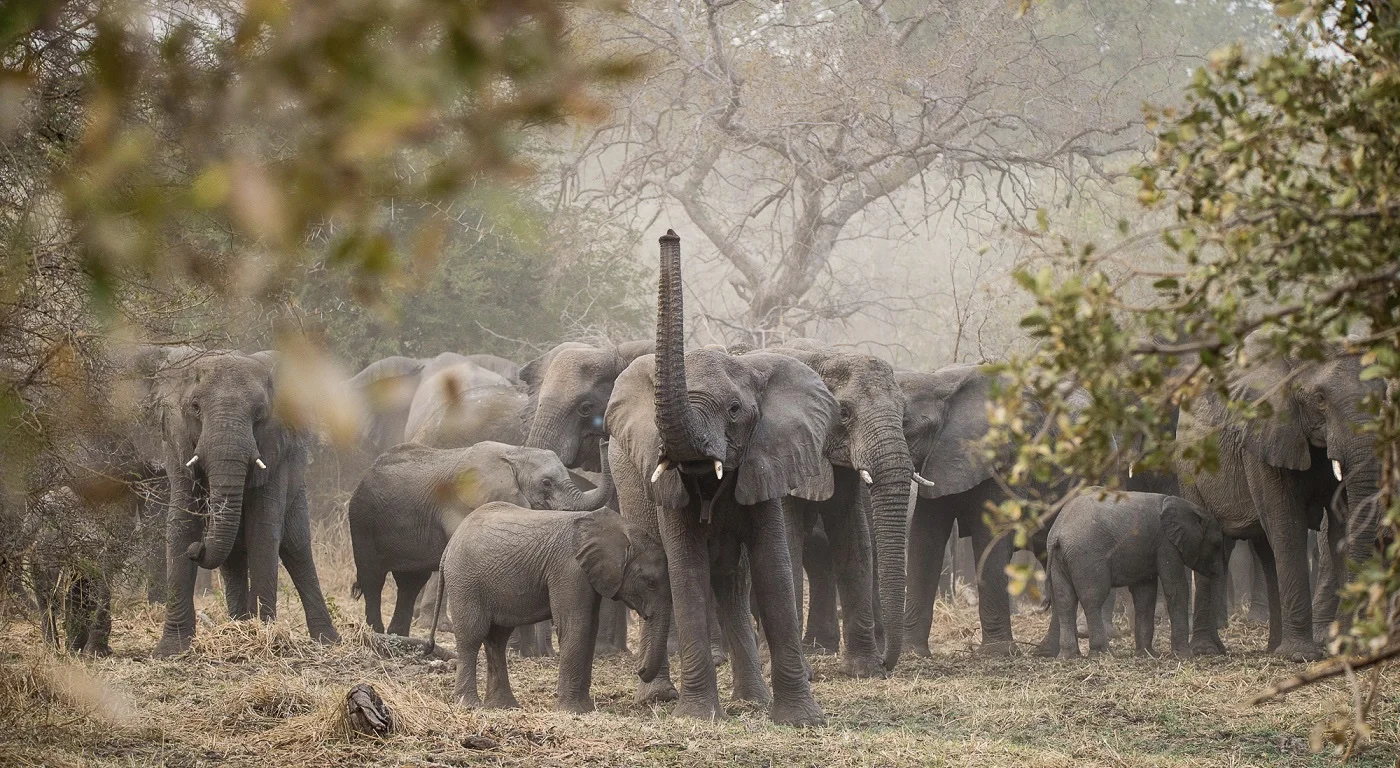A herd of African elephants with their young calves in Chad's Zakouma National Park / Photo: Kyle de Nobrega.
“When we first came here, flying over, we could still see white bones everywhere marking the massacre sites,” explained Rian Labuschagne to the wildlife journalist Rachel Nuwer. The pair were in flight over the Zakouma National Park in Chad, which Mr Labuschagne had previously managed on behalf of the South African-based conservation organization African Parks, and during his time in the country he oversaw the transformation of the remote parkland area from one rife with poachers to what is now a safe haven for Africa’s elephants.
Writing last week in The New York Times, award-winning Nuwer explains how in 2002, armed poachers, many from Sudan, began storming the park, reducing the elephant population from 4,000 to just over 400 in less than a decade, and killing seven park rangers in the process. She goes on to say how despite initial opposition from government advisers, the President of Chad, Idriss Deby, a long-time advocate for his country’s wildlife, brought in African Parks to take over Zakouma’s management, and how today, with more than 500 animals, the Zakouma herd is one of the largest surviving in Central Africa.
The Zakouma National Park is home to 50% of the remaining subspecies of giraffe / Photo: Kyle de Nobreaga.
Founded in 2000 in response to the dramatic decline of protected areas due to poor management and lack of funding, non-profit African Parks currently manages 15 national parks and protected areas in nine countries, covering 10.5 million hectares. Counting HRH Prince Harry as its President, the organization assumes complete responsibility for the rehabilitation and long-term management of national parks, in partnership with governments and local communities, and focuses on conserving Africa’s wildlife and remaining wild areas while ensuring that each park is ecologically, socially and financially sustainable for the long term.
With over 4,000 staff, African Parks is often the largest employer in the areas in which it works, and its presence also delivers wider benefits to the surrounding communities. “We’re building schools, delivering healthcare, and providing security for people and wildlife alike in once completely under-served or forgotten places,” explained Andrea Heydlauff, African Parks’ Chief Marketing and Communications Officer. “You cannot underestimate the dividends of secure and safe areas – everything else has a chance to flourish when stability is restored. People can live without fear, they can send their children to school, jobs emerge, and wildlife can rebound, all of which can lead to improved tourism, which creates important revenue for the parks and importantly for surrounding communities.”
Indeed, and as Rachel Nuwer writes, when Mr Labuschagne and his wife Lorna were brought in to direct efforts in Zakouma, they not only set to work modernizing the park’s communication center and facilities, weeding out corrupt staff and training and better equipping the rangers, but building stronger relationships with the local communities around the park.
Photo: Kyle de Nobreaga.
Despite losing six rangers to poachers themselves – they were gunned down execution style during their morning prayers - the African Parks’ Zakouma team persevered, and poaching has now essentially been eliminated. “Just last year, we counted 81 elephant calves under the age of three - in 2011 we counted one,” recalls Andrea Heydlauff. “The herd has stabilized and started breeding and is now on the rise for the first time in over a decade.” And she went on to say how employment has grown, schools have been built and that tourism is now contributing around $1 million a year to the park.
A black rhino being released into Zakouma National Park / Photo: Kyle de Nobrega
The story of Zakouma is one of the most remarkable conservation successes in Africa, and the park hasn’t suffered a confirmed poaching incident since January 2016. And not only is the elephant population growing, but earlier this month six black rhinos were brought to the park from South Africa, a critically endangered species that became extinct in Chad in the 70s when the last animals were poached for their valuable horns.
“I was fortunate enough to be there to see that plane land, delivering a threatened species back to an entire country,” said Heydlauff. “I spent time at the Park Manager’s home where wild bull elephants come to his porch every day – they’d walk past the water hole and wait patiently while each one got a chance to drink the cool fresh water from the hose we were holding.” She went on to explain how it’s not lost on anyone seeing this that just 10 years ago these elephants were being slaughtered at the hands of humans, and that here they are now, having forgiven and trusting us once again. “It’s enough to make you weep,” she said.
Zakouma has become a tale of hope and forgiveness, it’s a story of redemption and survival, and as Heydlauff succinctly puts it, “What’s happening there shows that we can re-engineer this mess we’ve made, if we so choose."
Learn more about the work of African Parks here.
Related Reading:
Brian Skerry: Ocean Soul
The Plight Of The Polar Bear And How You Can Help





